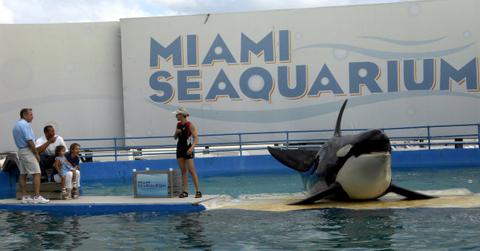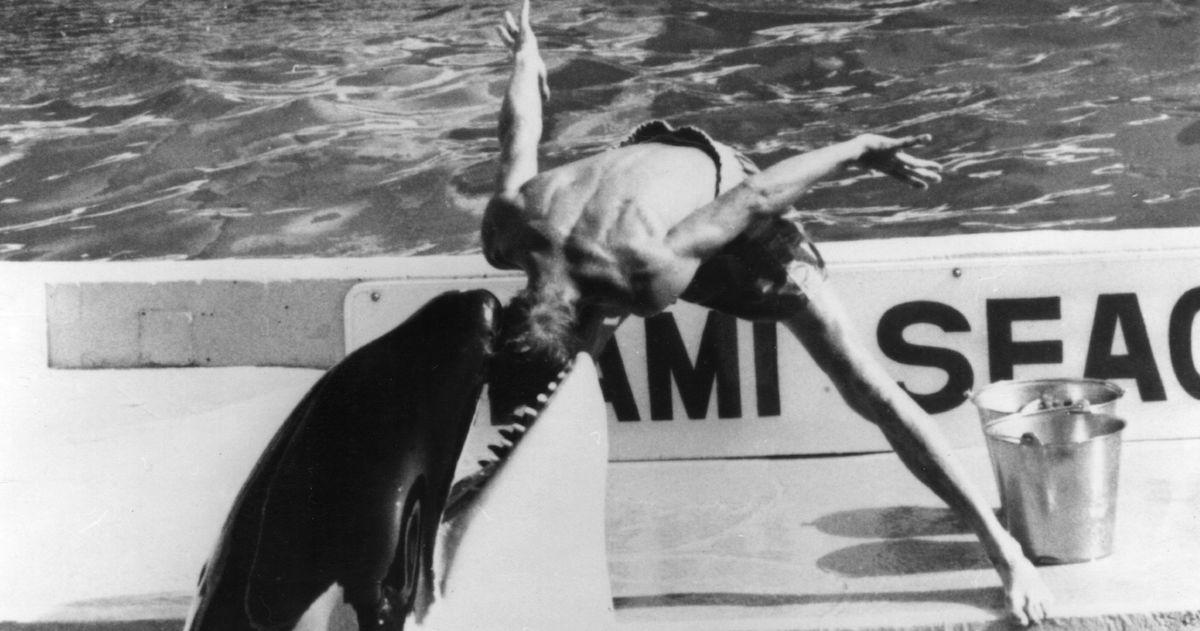Lolita, aka Tokitae, Dies In Captivity: The Famous Orca Was Set to Be Released This Year
Updated Aug. 21 2023, 9:31 a.m. ET

An orca who has been kept in captivity at the Miami Seaquarium for more than 50 years was finally on the path to freedom — but sadly, she passed away before being set free.
In August 2022, officials stated that they were considering releasing Lolita the orca into the wild, where she would be reunited with the mother she was taken from decades ago. Then, in March 2023, the Miami Seaquarium confirmed that Lolita would indeed return to the wild, pending the development of a plan to relocate her.
And then, in August 2023, the Miami Seaquarium shared an update on its plans to return Lolita to the wild — and then a few days later, the aquarium announced that Lolita had tragically passed away in her tank.
Keep reading for what we know about Lolita's death, her life story, and what was being planned for her release.
And for the record, Lolita is actually the orca's show biz name, given to her at the aquarium. Her original name is Toki-tae, and the name given to her by the Lummi Nation of Washington State is Sk’aliCh’elh-tenaut.
READ NEXT: This Teen Is Suing Her Home State in a Historic Climate Change Case

An animal trainer puts his head between the jaws of a Hugo the killer whale at the Miami Seaquarium, Florida, c. 1997.
Lolita the orca was captured back in 1970.
In 1970, a group of wild orcas was taken from a cove near Washington state’s Whidbey Island, near the Puget Sound, as reported by The Guardian. The news outlet cites Sandra Pollard’s book Puget Sound Whales for Sale: The Fight to End Orca Hunting, which includes bystander reports of the harrowing event.
In the book, one local stated that the abduction was “one of the most horrible things I’ve ever witnessed in my life,” adding that the scene was like watching a “prison camp, it was awful.” Other witnesses recalled hearing the whales cry out, as the men used explosives and other forceful measures to separate orca calves from their mothers.
In total, the men stole six baby whales that day, all of whom were sold to aquariums. Most of them died within a year, and today, only one is alive: Lolita.
Lolita aka Toki was then held in captivity at the Miami Seaquarium from that moment up until her devastating 2023 death. For over 50 years, she was forced to live — and perform tricks that go against her species’ nature — in what has been described as “the smallest tank in North America” by In Defense of Animals.
A USDA inspection report of the Miami Seaquarium, which included a 2021 evaluation of Lolita (referred to as Toki and Tokitae in the report), exposed a number of health issues Lolita was dealing with, including abnormal blood work, inflammation, a lower mandible injury, agitation, an injury from chlorine as evidenced by white lines in her eyes, and more. Additionally, the report found that the aquarium was not providing Lolita with adequate health care.
In general, whales and other cetaceans forced to live in captivity are only able to swim in circles or back and forth in their tank — while in the wild, they typically swim hundreds of miles each day, according to the Humane Society of the United States. These unnatural conditions can cause whales to develop zoochosis, which can lead to a variety of concerning behaviors, from aggression to lethargy.
Animal rights groups were working to free Lolita for years.
Before The Dolphin Company, who became the owners of the Miami Seaquarium in 2021, announced plans to free Toki, various animal rights groups had been working extra hard to convince the Miami Seaquarium to free her.
In March 2022, the USDA gave The Dolphin Company a license based on the condition that Lolita would no longer be displayed to the public. Soon after, The Dolphin Company announced that veterinary experts would be assessing Toki's health, according to In Defense of Animals. The organization added that philanthropist Pritam Singh extended an offer of $1 million to help enable Lolita’s rescue.
According to PETA, Monday, Aug. 8, 2022 was the 52-year anniversary of the day Lolita and those five other baby orcas were stolen from their homes in the wild. As the date approached, Mexican singer Paulina Rubio wrote a letter to the CEO of The Dolphin Company, asking him to send Lolita to a coastal sanctuary.
"Please don’t wait until it’s too late to give her the life she deserves,” Rubio wrote. “There is still time for Lolita to experience the ocean’s currents, swim greater distances and dive deeper, and live as an orca should.”
“PETA is demanding that the Miami Seaquarium stop Lolita’s suffering in this life of privation and send her to a sanctuary where she could feel the ocean currents and express natural behavior again, before it’s too late,” PETA Executive Vice President Tracy Reiman said in a statement shared with Green Matters in August 2022.
In March 2023, the news broke that Toki would be freed.
On March 30, 2023, The Dolphin Company, the Miami Seaquarium, and the nonprofit Friends of Toki announced that they officially plan to relocate Toki to wild waters in the next 18 to 24 months, and that "Lolita will receive the highest quality care as the team works to make relocation."
The Miami Seaquarium stated that it would be keeping Toki in captivity at its theme park in the meantime, and care for her during "her journey home," according to The Dolphin Company.
Jim Irsay, owner of the Indianapolis Colts, is providing the money needed for Lolita to be returned home, as reported by The Palm Beach Post.
In August 2023, the Miami Seaquarium announced that Lolita had passed away.
One year after officials announced that they were considering freeing Lolita, the Miami Seaquarium shared an an update on Toki, asserting that she was in good health, and that the team was still working on plans to relocate her to the wild. At the very least, she was no longer being forced to perform tricks or entertain audiences, and her stadium had been closed to the public.
However, she was still being denied the ocean's wide open spaces, was being forced to live in lonely isolation, unable to express her natural behaviors. According to Miami's WPLG Local 10, Lolita's tank was the second-smallest whale tank on Earth, and it never once achieved industry standards for a whale tank.
Then, less than a week later, the Miami Seaquarium announced that Lolita passed away.
"Over the last two days, Toki started exhibiting serious signs of discomfort," the company wrote on Facebook on Friday, Aug. 18.
"Despite receiving the best possible medical care, she passed away Friday afternoon from what is believed to be a renal condition," the post continued. A renal condition refers to kidney disease.
Again, just days prior, the Miami Seaquarium shared that Lolita was in good health — in a press release that has since been deleted from the internet. So was Lolita really in good health if her kidneys failed her a few days later?
Animal advocates are understandably devastated about Toki's death.
"Kind people begged the Miami Seaquarium to end Lolita’s hellish life in a concrete cell and release her to a seaside sanctuary," PETA President Ingrid Newkirk said in a statement. "But plans to make this move came too late, and Lolita was denied even a minute of freedom from her grinding 53 years in captivity."
In response to Lolita's death, the animal welfare organization is urging people "to honor her memory by never visiting marine parks." PETA and other animal groups are urging the Miami Seaquarium to free their captive dolphins, and asking SeaWorld to free its captive orca Corky.
Would it have been safe to relocate Lolita to the ocean?
Many have wondered if it would have been safe — or even possible — to return Lolita to the Washington waters. Her mother, who is in her 90s, is still swimming free in the Salish Sea, between the Pacific Northwestern state and British Columbia, and it would have been incredible to safely reunite them.
Howard Garrett, a researcher from the Orca Network on Whidbey Island, had been trying to free Lolita since 1995, and he told The Guardian that she could be safely be transported to the Pacific.
The Whale Sanctuary Project had a proposed plan to return Lolita to the Pacific as well. The organization's Charles Vinick told Newsweek in August 2022 that regarding Lolita’s release, the first priority will be her health; then, they “look forward to her return to her home waters in the Salish Sea."
Friends of Toki, a nonprofit that was working with the Miami Seaquarium to free Toki, wrote on its website that "all parties are working together to prepare and condition Toki for her return to a large, invigorating enclosure in her natal waters while simultaneously initiating Indigenous consultation, government permitting and design and fabrication of her ocean home in the Salish Sea."
Basically, Lolita was not going to simply be dropped in the ocean; rather, she was likely going to be put in a sea pen where she could still be monitored. But sadly, we never got to cross that bridge — instead, Toki crossed the rainbow bridge.
This article, originally published on Aug. 16, 2022, has been updated to include updates on Lolita and ultimately, the news of her death.